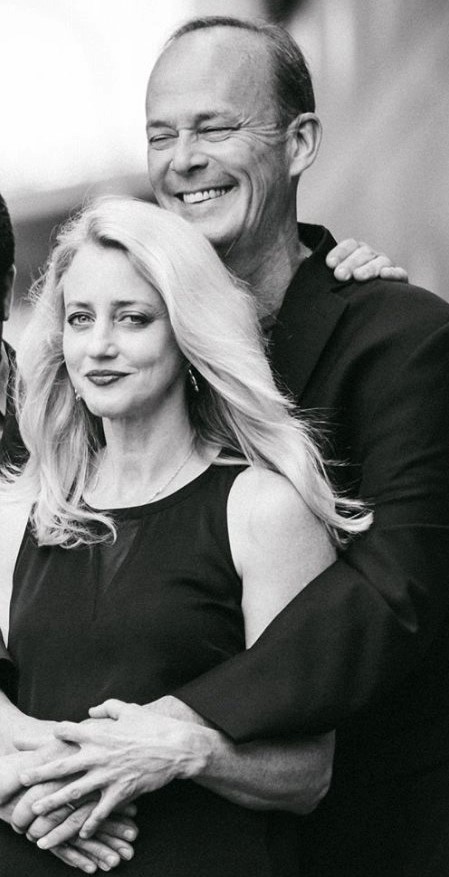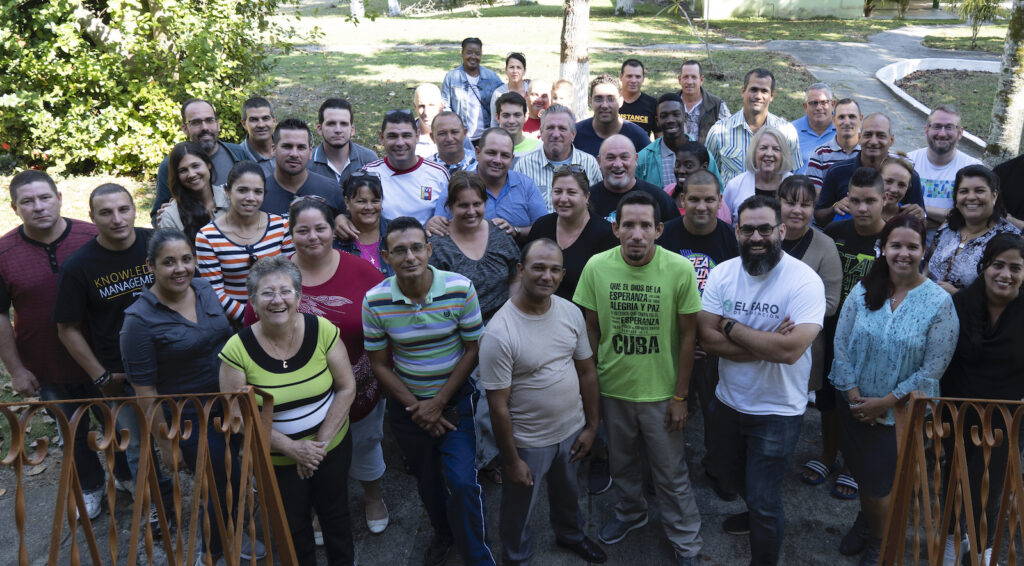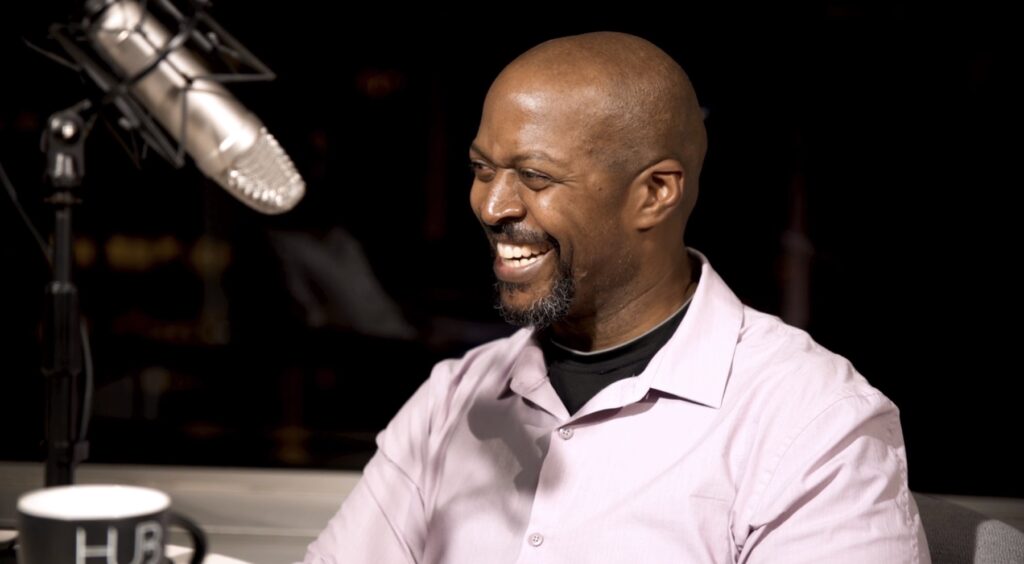HEATHER: My name is Heather Bixler. I am a violinist and a student at Columbia, studying neuroscience. I’ve been in New York since 1987.
I actually met David when we were both 13. We had the same piano teacher and we are both from the same town in Wisconsin, just south of Milwaukee. I didn’t know him very well, but we were both musicians. We both later happened to go to Indiana University for our undergraduate degrees and that’s where we got together. It was clear to us right from the beginning that we wanted to be together for life.
At the time we got engaged, we were staying with my in‑laws. I woke up early in the morning to come out to the kitchen to show my future mother‑in‑law my engagement ring, and her words to me were: “You’re in for a hard life.” I don’t think she was trying to be discouraging. She was happy. But she knew her son and she knew the life of a musician. I think she just foresaw that this was not going to be an easy life or an easy marriage; and it hasn’t been.
DAVID: My name is David Bixler. I am a saxophonist. Heather and I moved to New York after graduating. We came to pursue lives as musicians and had some major problems early on–more major than even I realized.
HEATHER: Historically, musicians have never been compensated for their skill and education. There were always money problems for us. Rough living that way. Then we had a baby without planning for one.
DAVID: I was going to become a father, and I was shocked. It just was not on my radar. The saxophone was on my radar. I was on my radar.
HEATHER: We learned to take all of our frustrations out on each other and created a lot of unkindness between us. David was ridiculed by his father when he was young, and he had learned ridicule to be a way of loving others. And so he would do that to me. It was humiliating. But I didn’t want to stay mad, so I would just take it. It led us to a point in our lives when I really, truly wanted out of our marriage, because I just wanted to feel loved and important–which I didn’t.
DAVID: I guess I was pretty oblivious to what was going on in my life. I was so focused on what I wasn’t doing as a musician, which was the prominent thing for me. I was ignorant of what my real priorities were in being a husband and a father. This ultimately led us and our marriage to a point of disintegration.
I was ignorant of what my real priorities were in being a husband and a father. This ultimately led us and our marriage to a point of disintegration.
HEATHER: I was very drawn to attention from other men. When they would pay attention to me, it felt really good, because I wasn’t getting that at home. So it wasn’t a situation where I was just “bored with marriage.” I was drawn away from my husband by my desire to be loved, to feel important. And then it became one specific person.
I knew it was wrong from the beginning. I remember wondering what was wrong with me, how I could do this thing that I believed was so wrong. I also felt very powerless, and I believe Satan does that. He makes you feel like you’re in prison when you’re not. All you have to do is open the door and walk out. But it’s the belief that you can’t, that the door’s locked–that is his biggest tool, and it worked on me for a long time. I looked outside of my marriage for answers to handle the problems inside my marriage. It felt terrible, and I lived in constant turmoil.
When you get involved in these kinds of relationships, it’s like a noose around your neck. The more you try to pull the noose off, the tighter it grips around your neck. And the only way to get out of it is cutting the noose. And cutting the noose for me was telling David everything, which I finally did.
I don’t think these things are handled very well by a lot of people. I think extramarital affairs are very misunderstood, especially in the church. All the focus was on what I did instead of on everything that both David and I did leading up to this. What I did was wrong, and it was the thing I regret more than anything in my life. But it also was a symptom of what had been going on before. That should have been addressed from the very beginning, but it wasn’t. All the focus was just on me, what I did, and how repentant I was supposed to be. That led to the situation becoming worse and worse. Eventually, I didn’t want to be married to David anymore.
DAVID: Our marriage was basically over. Our youngest son, Sean, started having seizures, the result of a traumatic brain injury that occurred when he was three months old. He had so much cognitive decline that there came a time when he could not remember his own name. I would say that was the ultimate low.
I remember being on an airplane with him, and we were flying back to New York. And he was talking to a gentleman, and the guy asked him his name. And he just sat there and then said, “You know, sometimes I can’t remember things.” It was heartbreaking. That caused me to really wave the white flag, saying, “God, I’m done, you got this.”
Witnessing what happened to Sean was really the moment of surrender for me. Experiencing forgiveness and grace, it was easy to reflect that onto Heather and the kids at that point. It was getting my eyes less focused on myself, and that enabled me to view the situation and Heather in a completely different light.

HEATHER: What I realized was that when we see an unhealthy person physically, that’s how we look to the Lord, spiritually, in our sin. When I would see my son have a tonic‑clonic seizure, which is violent, it looked like he was being electrocuted. He often would fall and harm himself in the process. I remember one time when he had a seizure, he fell and chipped his front teeth on the sink. It happened so suddenly without any opportunity to prepare.
I lived with this constant question: If I leave Dave, is God going to be mad at me? I knew my parents were going to be mad at me. I knew some people would be mad at me, which bothered me, but I was mostly concerned with whether God was going to be mad at me.
I would kind of hear this answer in my head, and it was this: “You may have good reason to leave Dave, but maybe there’s a better way. Maybe if you stay, there is a way that this can glorify God that’s completely different from what the natural course things would otherwise be.” I couldn’t ignore that voice.
The “still small voice” (1 Kings 19:12) is how the Bible describes it. I think that’s what that was. I knew I could never leave Dave, and I wanted something. Maybe it wasn’t to even get back what we had, but I wanted to move to something different, where we were together and there was no one else in between us.
DAVID: I think it was a recognition that we were a family and that we had to do a lot of things differently that changed.
HEATHER: As we changed and God softened our hearts, that process then became the new normal. And when we would fight and bicker and fall back into old patterns, that became abnormal and we would work very quickly to get back to that new normal.
DAVID: A positive story is being woven out of it, even as I am speaking to you right now. Even watching Sean have seizures, something strong is being made out of this. What has happened to him, on the one hand, is an awful thing. But for us as a family, God really has used this to pull us to himself and towards each other. I call it a “collateral blessing.”
HEATHER: The moment when I realized that we were back together without really saying it was right after Easter five years ago. It was right after Sean’s surgery where they removed part of the left occipital lobe of his brain, which reduced his seizures by about 90 percent.

After that dramatic and terrifying surgery, spring came. On Easter, it was a beautiful day in Bowling Green, Ohio. There was a beautiful magnolia tree in our backyard that was in bloom. We were sitting out there under it and it was kind of a chilly day. We had blankets around us. I was with David and our two youngest, Colleen and Sean. I remember having a glass of wine, sitting on a blanket on the grass and thinking, “I’m with the only people I want to be with. I don’t want anyone else in this marriage, in my family,” and just realizing that we were together again. I felt on a high from that realization.
Psalm 40 was prominent in my mind at that time. God brought me out of a miry pit. I think the Bible says slimy and mirey. He uses two adjectives to describe how disgusting that is. And you come out of that and your feet are set on solid ground. There’s a new song put in your heart, a song of praise to the Lord. That was in my mind that day.
We didn’t have some big, dramatic reconciliation. I just knew we were on the right path at that point. I knew that I was obeying God and that I was honoring my commitment that I had made years before when I promised David in front of God that I would stay with him for my whole life. Staying and working through those hard years was what I said “yes” to all those years before.
Sean is continuing to have seizures. He had a second brain surgery that gave the doctors more information, but did nothing to gain further seizure control. Being in the hospital and the effects of so many seizures have caused his life to be more difficult than I can even describe. I don’t know why God hasn’t healed him as I have pleaded his case before the Lord every day for 9 years now. But I know that God is continuing to heal my marriage and my heart and that is where I can find joy–that is how I choose joy–in the midst of sorrow.




